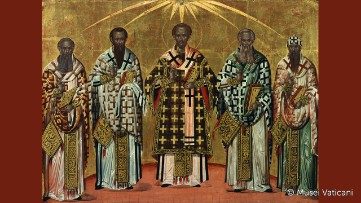Sts. Basil the Great and Gregory Nazianzus, Bishops and Doctors of the Church

A family of Saints
Saint Basil, born in Caesarea in 329, belonged to a family of saints: his sister Macrina and his brothers Peter, bishop of Sebaste, and Gregory of Nissa (Nazianzen) were also elevated to the honors of the altars. The young Basil had from his father his first training in the rudiments of Christian doctrine, and he continued his studies first in Constantinople and then in Athens. At the same time, he undertook the study of rhetoric, starting a brilliant career. He soon decided, however, to abandon that path and follow his true vocation, to a life of silence, solitude and prayer. He traveled for a long time, first in Pontus, then in Egypt, in Palestine and in Syria, drawn to the life of the monks and hermits. Returning to Pontus, he reunited with Gregory of Nissa, who he had known in Athens, and with him founded a small monastic community, based on the rules that Basil had elaborated during the experiences acquired during his travels.
Against Arianism
Meanwhile, a new doctrine, based on the preaching of one Arius, who had already been condemned as a heretic by the Council of Nicea in 325, was increasingly gaining ground. Arianism, however, thanks also to the support of the eastern emperor, Valens, spread rapidly in Syria and Palestine. Basil left the peace and security of his hermitage, reached Caesarea, was ordained as a presbyter and then bishop, and began a struggle without quarter against the new heresy, earning for himself the title of “the Great” even in his own lifetime. His struggle was not only on the doctrinal level, but also on the charitable one; to the Arians, who claimed not to harm anyone by defending what was right, he replied: “What really belongs to you? From whom did you receive what you say is yours? If everyone were satisfied with what was necessary, and gave the superfluous to the next, there would be no more poor people.” He also founded a citadel of charity called Basilias, which included orphanages, hospitals and shelters. Meanwhile, even the emperor Theodosius, who succeeded Valens, supported the work of Basil, who managed to see the heresy defeated before his death in 389.
A lifelong friend
Gregory Nazianzen also had a sister, Gorgonia, and a brother, Cesarius, both of whom are venerated as saints. He was the son of a presbyter, and in Athens, where he studied, he met Basil, to whom he was bound by profound friendship and with whom he shared the hermitage in Cappadocia. However, he too had to abandon that peace to assist his elderly parents. His father, in particular, wanted him by his side in the presbyterate at Nissa, but Gregory, who had let himself be convinced in spite of himself, regretted his choice and sought refuge again with Basil. Basil instead convinced him to return to his father to be his advisor in the difficult government of the Church of Nissa. Later, Gregory was sent by the emperor Theodosius to Constantinople, with the task of fighting the spread of the Arian heresy. Received upon arrival by a hail of rocks, Gregory stopped outside the walls of Constantinople in a small church, which he dedicated to the Resurrection. Thanks to his eloquence and to the solidity of his doctrine, but above all thanks to his exemplary life, Gregory brought the city back to orthodoxy. Despite this, opposed by a faction that was against him, he did not become bishop of Constantinople. Leaving the city to which he had dedicated his life with countless efforts, he pronounced a long, moving farewell speech. Returning to Nissa, he devoted himself above all to writing, and left a copious collection of spiritual verses. “Everything is hard for mortals,” he wrote, “everything is ridicule, shadow, appearance - and that everything should be unstable, O Word, which hast created us, we owe to Thy wisdom, that we might learn to turn our love to that which is stable and firm.”







